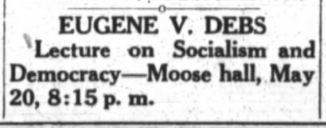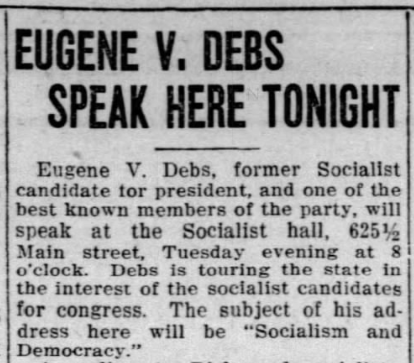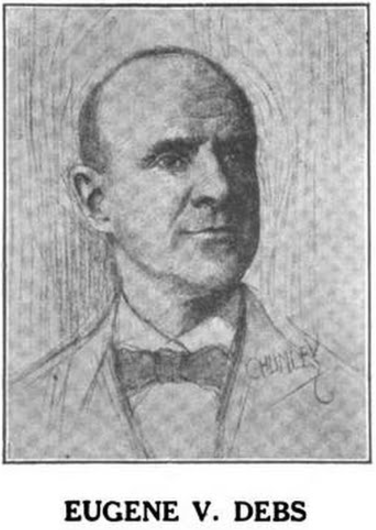
~~~~~~~~~~~~~~~~~~~~~~~~~~~~~~~~~~~~~~~~~~~~
Hellraisers Journal, Tuesday June 11, 1918
Fort Wayne, Indiana – Claude G. Bowers Describes Debs on Speaker’s Platform
Following a speech given May 20th by Eugene Debs at Moose Hall in Fort Wayne, Indiana, Claude G. Bowers devoted space in his column, “Kabbages and Kings,” to give a moving description of Debs as he appeared on the speaker’s platform:
Last week a tall, lean, long-legged man with a lean, thin, sharp face and piercing eyes, stood on the platform at the Moose hall in this city and talked for more than an hour on “Socialism and Democracy.” It was evident that the greater part of the audience was in sympathy with his ideas and more than ordinarily in love with the man. He was a socialist,-perhaps the most famous America has produced….
There was no bitterness against men. Very little mere bitterness against principles and systems. The most biting things were the flash of wit and humor. These cut like a knife but the audience laughed. The speaker was Eugene V. Debs. As an orator he is among the finest….
[Note: the entire column can be found below.]
[Inset is from The Fort Wayne Journal-Gazette of May 19th.]
—–
On May 21st Debs spoke on “Socialism and Democracy” in Richmond, Indiana. Thankfully, a bit of that speech was recorded by a reporter in the audience.
From The Richmond Palladium of May 22, 1918:
SOCIALISM IS “NEXT IN ORDER” SAYS DEBS
—–
Eugene V. Debs, four times a candidate for president of the United States on the Socialist ticket, and one of the leaders of the party [Socialist Party of America], addressed a well attended meeting of Richmond socialists Tuesday night on “Socialism and Democracy.” The meeting was held in a hall over the King Printery at 625 Main street.
Debs discussed the principles of the Socialistic movement and the progress of the party along general lines. He told of the purposes of the party, of what it had accomplished in the past, and what it expected to accomplish in the future.
Characterizing as “stupid and silly” the accusation that Socialists were disloyal and pro-German, Mr. Debs said:
There is not a Socialist in the world who is not an enemy of the kaiser, who represents everything we are opposed to and everything we are banded together to destroy.
[The speaker said:]
Socialism and Democracy are synonomous terms. In the control of large industries such as railroads and munition plants the United States government has taken a step toward the accomplishment of our purpose. The old order of society can survive but little longer. Socialism is next in order. The swelling minority against us, the rapid growth of our own party, sounds warning of the impending change. Soon that minority against our movement will become a majority in our favor and then will come the co-operative commonwealth.
———-
[Inset is from the Palladium of May 21.]
From The Fort Wayne Journal-Gazette of May 26, 1918:
Debs-As An Orator.
[From “Kabbages and Kings” by Claude G. Bowers]
Last week a tall, lean, long-legged man with a lean, thin, sharp face and piercing eyes, stood on the platform at the Moose hall in this city and talked for more than an hour on “Socialism and Democracy.” It was evident that the greater part of the audience was in sympathy with his ideas and more than ordinarily in love with the man. He was a socialist,-perhaps the most famous America has produced. And in the opinion of the many who carefully protect their “respectability” from contamination by refusing to hear him, he is probably thought of as a ranting, passion-tearing, extravaganza of intemperate speech, with a penchant for the choice of bad grammar.
These would have been startled at the contrast between their preconceived notion and the reality. The speaker might have been a college professor, but for the fact that he spoke with greater finesse and art than the average professorial lecturer. But he scarcely raised his voice above the conversational tone. His English was pure and his words exquisitely chosen to convey the precise meaning intended. His gestures were illuminative and in no sense suggestive of the sledge hammer swinger. But he illustrated wonderfully well the vast possibilities of mere modulation. A word in no sense disturbing in cold print was given its full frightful meaning by the tone in which it was uttered. There was no striv[ing?] after spectacular effects. Nothing sensational. And the lecture was not loosely arranged. Each sentence naturally and inevitably followed the preceding. And each sentence conveyed an idea. It makes no difference what your opinion of the idea-it was an idea.
There was no bitterness against men. Very little mere bitterness against principles and systems. The most biting things were the flash of wit and humor. These cut like a knife but the audience laughed. The speaker was Eugene V. Debs. As an orator he is among the finest. And here is an idea that may startle some one,-he suggests in his speaking methods the president more than any other orator that I have ever heard. In the case of both the thought is the thing and the perfect expression of the thought the method. There have been other orators of the same general type. It was the method of Wendell Phillips. He was one of the most powerful and polished orators we have ever had, but there was as nothing “Oratorical” in his manner. He did not advertise himself as an “orator” by his gesture and the strength of his voice. He spoke in the conversational tone but his enunciation was more satisfying than volume of sound, and his modulation more eloquent than sweeping gestures. The same was also true in a sense of Ingersoll.
Debs and Boston.
It would be impossible to conceive of a more erroneous idea than that Debs is a ranting, rattle-brained, intemperate, wild eyed, and dangerous agitator. Since he has appeared for so many years on the lecture platform and at universities this idea is not so prevalent as it once was; but in the early days of his national renown it was the popular notion. He once told me of an experience of those days in Boston which illustrated the man. He had lectured in Boston,-at Faneuil hall, and on returning to his room after the lecture he found a note from the editor of the New England Magazine-I think it was-to the effect that he had heard the lecture and would like for him to be his guest at a luncheon of some blue stocking society which made a practice of meeting at luncheon once week or month. Both men and women were members and they represented the intellect and culture of Boston.
The following day Debs appeared. It soon became evident as the luncheon progressed that no one but his host knew his identity which rather accentuated the embarrassment. At length the editor rose, asked the indulgence of the crowd for having invited a guest concerning whom there was much criticism, expressed the opinion that he had been painted in colors too dark, and presented-Debs. The expression on the faces about the table was disconcerting,-especially on the faces of the women. Just such an expression of mingled fear and loathing as might appear should a snake suddenly have been seen at their feet.
A man with coarser instincts would have been angered; and one less capable of understanding would have been hurt. It neither angered or hurt Debs. And he began to speak in moderation of spirit, in a conversational tone, and as he talked the prejudice gradually subsided; and as his wit and humor sparkled and flashed he was rewarded with chuckles, and when he closed he had made no converts to socialism but had won a personal regard which ripened in many cases into warm personal friendships. From that time on he has been more warmly received by Boston audiences than by those of any other large city in the country.
His popularity there as a lecturer was impressed upon the writer several years ago while seated on the veranda of a hotel on the bay facing Boston across the waters. A number of Boston men were talking about public speakers and particularly lecturers and expressing their preferences, for this and that man. Finally one spoke up with the comment that while he “could not see” the ideas behind the speaker he more thoroughly enjoyed listening to Debs than to any other speaker who visited the Hub. At that all spoke up in a chorus-“Oh, yes, Debs, of course, Debs.”-as though all placed him in a class apart as a lecturer and speaker.
[Paragraph breaks and drawing of Debs by Chumley added.]
~~~~~~~~~~~~~~~~~~~~~~
SOURCES
Fort Wayne Journal-Gazette
(Fort Wayne, Indiana)
-May 26, 1918
https://www.newspapers.com/image/29172761/
The Richmond Palladium
(Richmond, Indiana)
-May 22, 1918
https://www.newspapers.com/image/246687961/
IMAGES
EVD Quote, Revolutionary Solidarity, ISR Feb 1918
https://archive.org/stream/ISR-volume18#page/n203/mode/1up
AD, EVD to spk May 20, Ft Wyn Jr Gz p13, May 19, 1918
https://www.newspapers.com/image/29168264/
EVD to speak this evening, Richmond IN Pldm p10, May 21, 1918
https://www.newspapers.com/image/246687824/
EVD by LS Chumley, ISR Jan 1916
https://play.google.com/books/reader?id=9VJIAAAAYAAJ&printsec=frontcover&pg=GBS.RA1-PA382
See also:
“Recollections of Ingersoll” by Eugene V. Debs
-from Pearson’s Magazine of April 1917
https://www.marxists.org/archive/debs/works/1917/170400-debs-recollectionsofingersoll.pdf
“Wendell Phillips: Orator and Abolitionist”
-by Eugene v. Debs
Pearson’s Magazine of May 1917
https://www.marxists.org/archive/debs/works/1917/170500-debs-wendellphillips.pdf
~~~~~~~~~~~~~~~~~~~~~~~~~~~~~~~~~~~~~~~~~~~~
The Ghost of Tom Joad – Bruce Springsteen & Tom Morello



